|
The Eloi Medals for outstanding time travel |
| and |
|
The Master Traveller Citations
recognizing innovative writers |
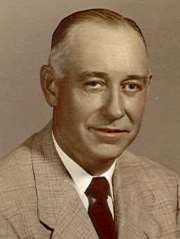 George H. Main—notice his uncanny resemblance to the Traveller in the first picture below!
George H. Main—notice his uncanny resemblance to the Traveller in the first picture below!
|
For example, there were the Best of Barsoom Ribbons for intrepid interplanetary fiction, the Navaho Feathers for best westerns (although apart from The Virginian, all of those awards went to Zane Grey), and the Athabaskan Awards for the most impassioned dog stories. And, as I found out as a kid poking around in his attic, there were the Eloi Medals for Outstanding Time Travel. According to his journals, The Time Machine was the first recipient of an Eloi Medal. Appropriately enough, later recipients were not always awarded in chronotypical order. For example, the second award went to Mark Twain’s classic A Yankee in King Arthur’s Court (1889), and then the award jumped forward again for Max Beerbohm’s 1916 story, “Enoch Soames: A Memory of the Eighteen-Nineties.”
In addition, Grandpa also had a series of awards to recognize individual writers whom he saw as exhibiting remarkable innovation. In each field, these awards were named after a particularly important fictional character: Naturally enough, innovative time travel writers became Master Travellers, starting with H. G. Wells himself. Mark Twain was also a Master Traveller, as were many of Grandpa’s other favorite authors including Charles Dickens, Edgar Allan Poe, and even Rudyard Kipling.
Once I discovered time travel through Grandpa, I was hooked as well, and in the summer of 1960 he surprised me on my birthday with my first trip to the silver screen where the two of us were awakened by Rod Taylor’s cinematic depiction of the original Traveller. (Yes, I was also awakened by Yvette Mimieux, that that’s a different story). Right after that movie, sitting at the soda fountain at the Odessa Rexall, I pledged to Grandpa that I would continue his tradition of finding the most outstanding examples of time travel throughout the ages, and thus we have this page listing all the Eloi Gold Medal winners and the Master Travellers right up to the present day. I wish that Grandpa, who died in 1980, had lived to see Back to the Future and Terminator.
In the list, you may notice that one story received both an an Athabaskan Award and Eloi Medal, while another was awarded both a Barsoom Ribbon and an Eloi Medal. That’s because, as Grandpa put it, “Wooly mammoths don’t crop up in the modern Yukon without some help, and you can bet the farm that John Carter isn’t cavorting with Dejah Thoris on today’s Mars.”
You might also wonder why some years have multiple medals while others have none.
I wondered about that, too, but Grandpa had an answer: “Not all pigs have the same radius,” he said.
No, at my young age, I didn’t understand his pig-wisdom either, but I had no doubt he was wise.
After you browse the list, I hope you’ll also take a look at the
Internet Time Travel Database. In addition to the Eloi Gold Medals
and Master Traveller Citations, the list includes Eloi Silver, Bronze, and Honor Medals and thousands of more time travel stories,
all of which is dedicated to Grandpa.
The most renowned of all the Eloi along with the Traveller down through the ages

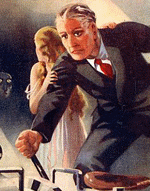

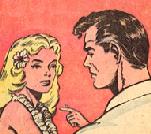

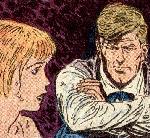

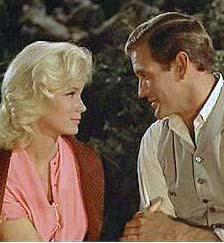

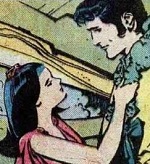

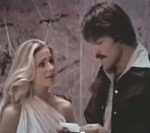

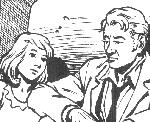

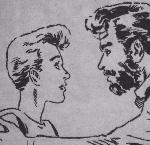

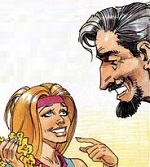

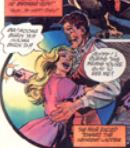

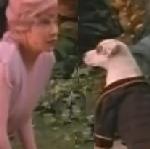

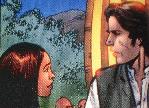

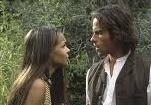

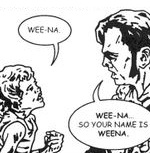

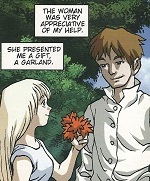

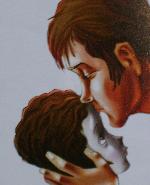



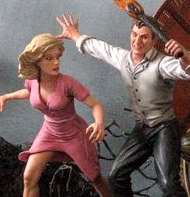



The Master Traveller Citations
recognizing innovative writers
![]() 1686-1765
1686-1765
Samuel Madden, for the first time travel story
![]() 1742-1785
1742-1785
Johan Herman Wessel, for the first human time travel to the future
![]() 1789-1859
1789-1859
Pierre Boitard, for the first human time travel to the past
![]() early 1800s
early 1800s
An Anonymous Dublin University Author, for the first visit to a historic person
![]() 1806-1854
1806-1854
Émile_Souvestre, came within half a screwdriver’s turn of a time machine
![]() 1809-1849
1809-1849
Edgar Allan Poe, for the first visit to a historic event
![]() 1812-1870
1812-1870
Charles Dickens, for the most-imitated time travel plot
![]() 1822-1904
1822-1904
Frances Power Cobbe, for the first invention to send information through time
![]() 1835-1910
1835-1910
Mark Twain, for first introduction of modern technology to the past
![]() 1842-1902
1842-1902
Enrique Gaspar, for the first time machine invented by a scientist
![]() 1852-1927
1852-1927
Edward Page Mitchell, for first artifact to transport humans through time
![]() 1865-1936
1865-1936
Rudyard Kipling, for the Puck stories (and because Grandpa loved Kipling)
![]() 1866-1946
1866-1946
H.G. Wells, for unparalleled contributions to the field
![]() 1886-1962
1886-1962
Willis O’Brien, for bringing time travel to the silver screen
![]() 1887-1963
1887-1963
Ralph Milne Farley, for his omnibus of time travel stories
![]() 1904-1988
1904-1988
Clifford D. Simak, for time travel contributions spanning 56 years
![]() 1907-1988
1907-1988
Robert A. Heinlein, for the last word on sexual paradoxes
![]() 1907-2000
1907-2000
L. Sprague de Camp, for fictional and nonfictional contributions to the field
![]() 1908-2006
1908-2006
Jack Williamson, for Legionnaires everywhen
![]() 1910-1971
1910-1971
John W. Campbell, Jr., for all his Astounding work and more
![]() 1911-1987
1911-1987
C. L. Moore and
1915-1958 Henry Kuttner, for their timeless partnership
![]() 1911-1958
1911-1958
Anthony Boucher, for founding F&SF plus a dozen inventive time travel stories
![]() 1912-2005
1912-2005
Andre Norton, for the first series of time travel novels
![]() 1914-1996
1914-1996
H.L. Gold, for the first story of when eras collide
![]() 1915-1993
1915-1993
Lester del Rey, for bringing time travel to elementary school readers
![]() 1920-1992
1920-1992
Isaac Asimov, for two dozen contributions, an ugly little boy, and Eternity


The Eloi Gold Medals for Outstanding Time Travel
![]() 1843
1843
A Christmas Carol
by Charles Dickens [Disputed Award: Questionable time travel!]
![]() 1889
1889
A Yankee in King Arthur’s Court
by Mark Twain
![]() 1895
1895
The Time Machine
by H.G. Wells
![]() 1901
1901
“When Time Turned”
by Ethel Watts Mumford
![]() 1912
1912
A Princess of Mars
by Edgar Rice Burroughs
![]() 1916
1916
“Enoch Soames: A Memory of the Eighteen-Nineties”
by Max Beerbohm
![]() 1935
1935
“The Man Who Met Himself”
by Ralph Milne Farley
![]() 1935
1935
“Time Found Again”
by Mildred Cram
![]() 1938
1938
“The Sword in the Stone”
by T.H. White
![]() 1939
1939
“Lest Darkness Fall”
by L. Sprague de Camp
![]() 1941
1941
“Yesterday Was Monday”
by Theodore Sturgeon
![]() 1941
1941
“By His Bootstraps”
by Robert A. Heinlein
![]() 1942
1942
“My Name Is Legion”
by Lester del Rey
![]() 1945
1945
“What You Need”
by Henry Kuttner and C.L. Moore
![]() 1947
1947
The Man Who Never Grew Young
by Fritz Leiber, Jr.
![]() 1947
1947
“Time and Time Again”
by H. Beam Piper
![]() 1953
1953
“A Scent of Sarsaparilla”
by Ray Bradbury
![]() 1954
1954
“Breakfast at Twilight”
by Philip K. Dick
![]() 1955
1955
“Target One”
by Frederik Pohl
![]() 1955
1955
The End of Eternity
by Isaac Asimov
![]() 1956
1956
“Consider Her Ways”
by John Wyndham
![]() 1956
1956
The Door Into Summer
by Robert A. Heinlein
![]() 1958
1958
“Thing of Beauty”
by Damon Knight
![]() 1958
1958
“The Ugly Little Boy”
by Isaac Asimov
![]() 1959
1959
“—All You Zombies—”
by Robert A. Heinlein
![]() 1959
1959
“The Love Letter”
by Jack Finney
![]() 1959
1959
The Twilight Zone
created by Rod Serling
![]() 1960
1960
The Time Machine
by David Duncan, directed by George Pal
![]() 1962
1962
“Prisoners of Doctor Doom”
by Stan Lee, Jack Kirby, and Joe Sinnott
![]() 1962
1962
“The Final Victory of Doctor Doom”
by Stan Lee, Jack Kirby, and Chic Stone
![]() 1965
1965
“The Kilimanjaro Machine”
by Ray Bradbury
![]() 1962
1962
“Bedlam at the Baxter Building”
by Stan Lee, Jack Kirby, and Vince Colletta
![]() 1966
1966
“Divine Madness”
by Roger Zelazny
![]() 1966
1966
“Behold the Man”
by Michael Moorcock
![]() 1966
1966
lequo;Assignment: Earth”
by Art Wallace, directed by Marc Daniels
![]() 1967
1967
“Hawksbill Station”
by Robert Silverberg
![]() 1967
1967
“Dragonrider”
by Anne McCaffrey
![]() 1969
1969
Slaughterhouse-Five
by Kurt Vonnegut
![]() 1962
1962
“Worlds without End!”
by Stan Lee, John Buscema, and Sal Buscema
![]() 1973
1973
Time Enough for Love
by Robert A. Heinlein
![]() 1978
1978
Mastodonia
by Clifford D. Simak
![]() 1979
1979
Kindred
by Octavia E. Butler
![]() 1980
1980
The Muppet Show
created by Jim Hensen
![]() 1984
1984
The Terminator
by James Cameron and William Wisher, Jr.
![]() 1984
1984
“The Life of Boswell”
by Jerry Oltion
![]() 1985
1985
Back to the Future
by Robert Zemeckis and Bob Gale, directed by Robert Zemeckis
![]() 1986
1986
Peggy Sue Got Married
by Jerry Leichtling and Arlene Sarner, directed by Francis Ford Coppola
![]() 1986
1986
Calvin and Hobbes
by Bill Watterson
![]() 1988
1988
Star Trek: The Next Generation
created by Gene Roddenberry
![]() 1988
1988
“Ripples in the Dirac Sea”
by Geoffrey A. Landis
![]() 1989
1989
“Genesis”
by Donald P. Bellisario, directed by David Hemmings
![]() 1989
1989
“Good Morning, Peoria”
by Chris Ruppenthal, directed by Michael Zinberg
![]() 1991
1991
Farside
by Gary Larson
![]() 1991
1991
T2: Judgement Day
by James Cameron and William Wisher, Jr., directed by James Cameron
![]() 1992
1992
The Guns of the South
by Harry Turtledove
![]() 1991
1991
Groundhog Day
by Danny Rubin and Harold Ramis, directed by Harold Ramis
![]() 1995
1995
Star Trek: Voyager
created by Rick Berman, Michael Philler, and Jeri Taylor
![]() 1996
1996
“Time Travelers Never Die”
by Jack McDevitt
![]() 1996
1996
Early Edition
created by Bob Brush
![]() 2001
2001
Star Trek: Enterprise
created by Rick Berman and Brannon Braga
![]() 1998
1998
Time Machines, second edition
by Paul J. Nahin
![]() 2002
2002
“Veritas”
by Robert Reed
![]() 2003
2003
“The Day the Track Stood Still”
by John C. Bodin and Ron Collins
![]() 2006
2006
The Lake House
by David Auburn
![]() 2008
2008
Eureka
created by Andrew Cosby and Jaime Paglia
![]() 2009
2009
“First Flight”
by Mary Robinette Kowal
![]() 2012
2012
“Mrs. Hatcher’s Evaluation”
by James Van Pelt
![]() 2020
2020
“How Time Travel Could and Should Work”
by Sean Carroll
![]() 2021
2021
The Map of Tiny Perfect Things
by Lev Grossman, directed by Ian Samuels